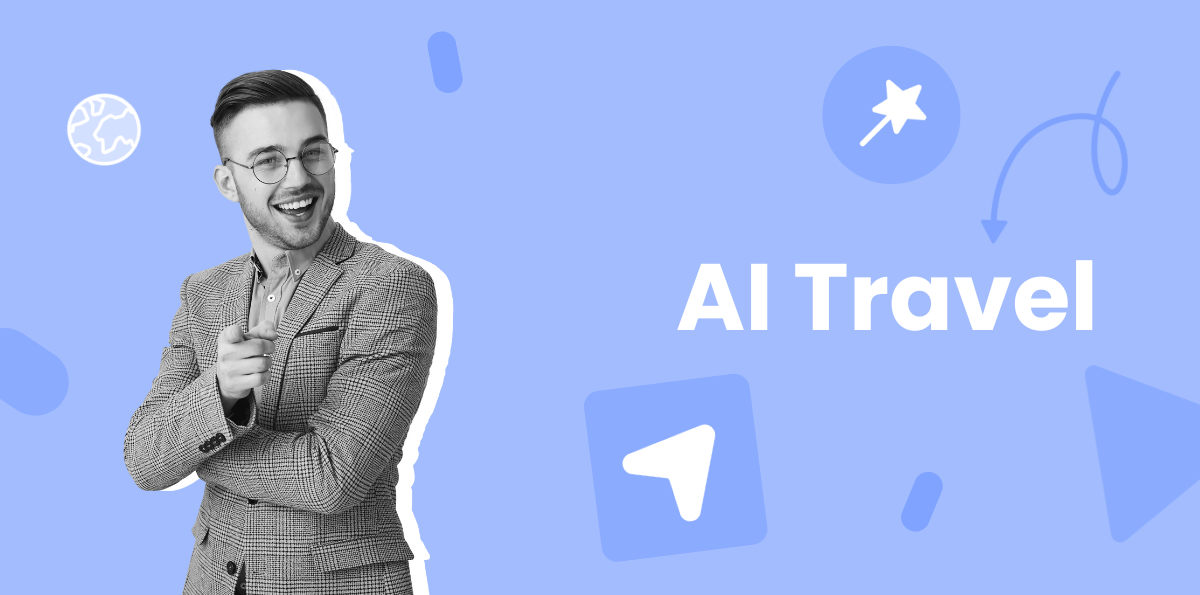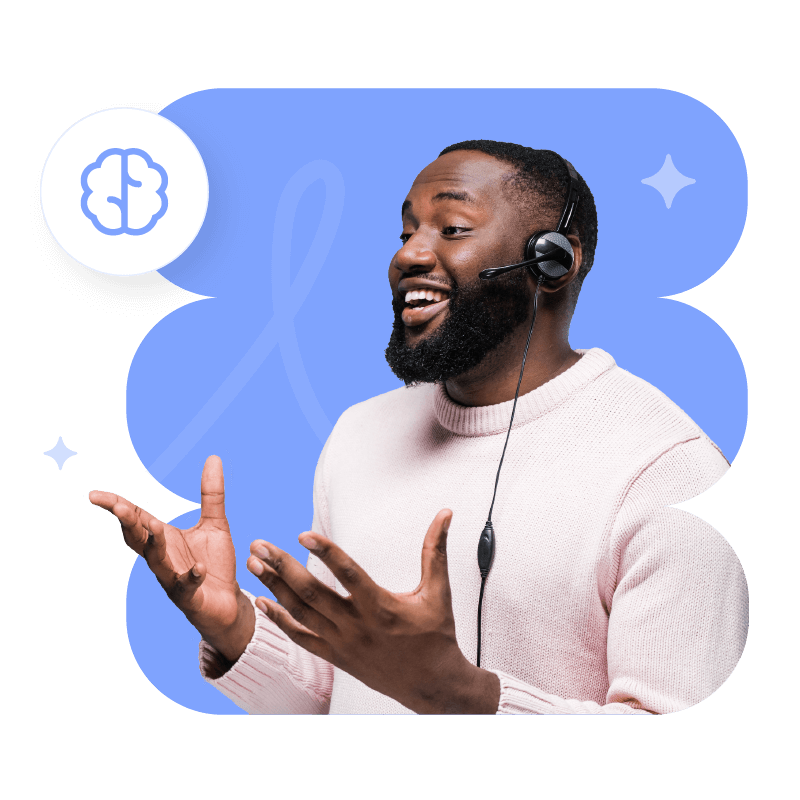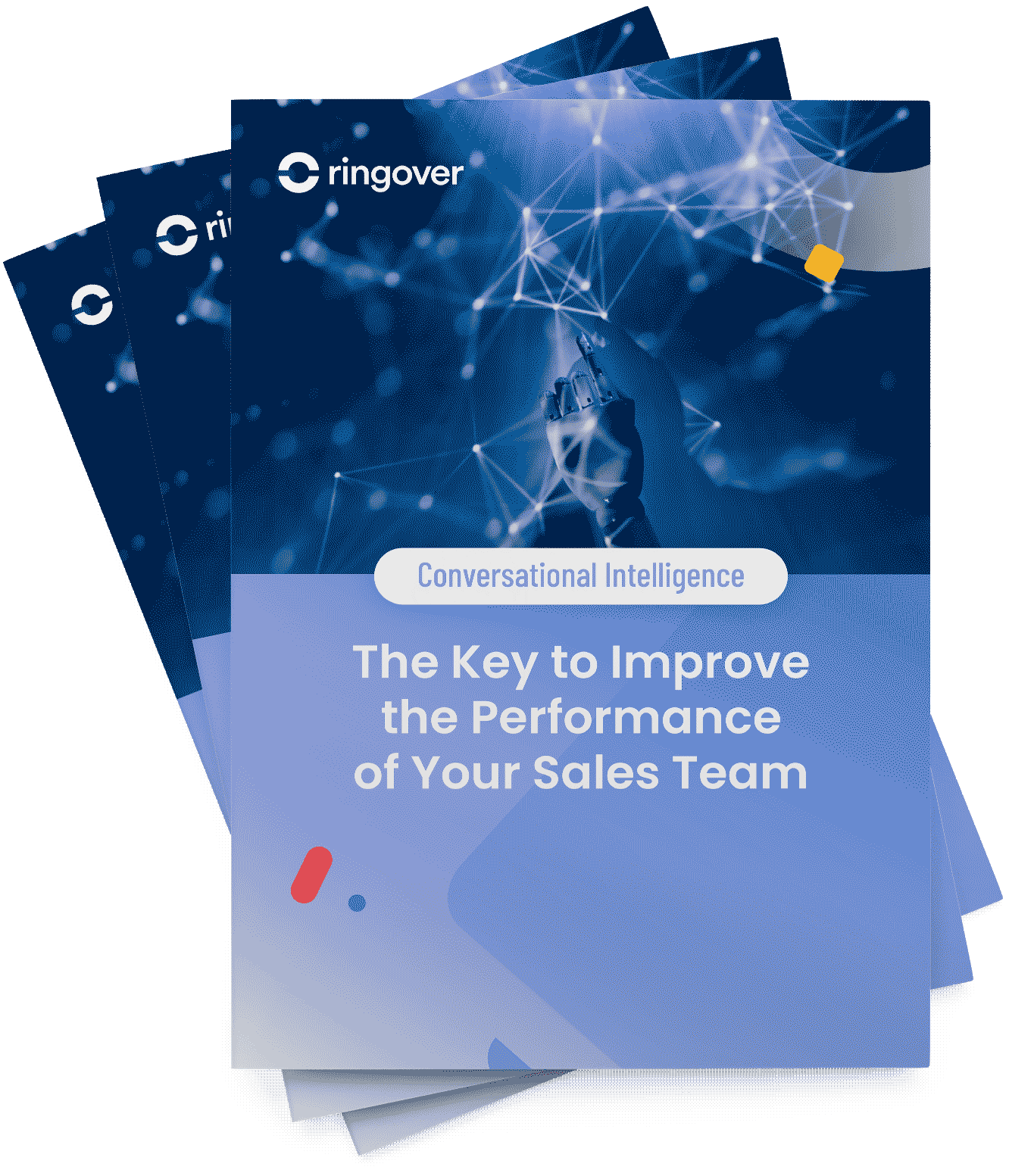Summary
Regardless of whether you are a frequent voyager or setting out on your maiden voyage, AI travel planning is poised to redefine your journey in unimaginable ways.
Learn More About Empower by RingoverTable: Best 6 Tools for AI Travel
| Software Name | Description | Key Features |
|---|---|---|
| Layla | Creates personalised itineraries by understanding your preferences | Customised itineraries, personalised recommendations, smart optimization, real-time updates, budget management |
| Mindtrip | Includes maps, reviews, and tools for collaboration, making planning more collaborative and fun | Customizable itineraries, maps, reviews, collaboration tools, real-time booking links, popular itineraries |
| Vacay Chatbot | recommendations for destinations and activities | Rapid response, instant suggestions, customizable itineraries, live event bookings, family-friendly |
| Hopper | AI-powered app that predicts flight and hotel prices, helping users find the best deals | Price prediction, Fare freeze, Personalised travel recommendations |
| HelloGbye | Travel booking assistant that simplifies group travel planning and coordination | Group booking automation, Natural language processing, Custom itineraries |
| Kayak | AI-enhanced travel search engine for flights, hotels, and car rentals | Flexible date search, Price alerts, AI-powered trip recommendations |
List: Top 6 AI Tourism Solutions
1. Layla
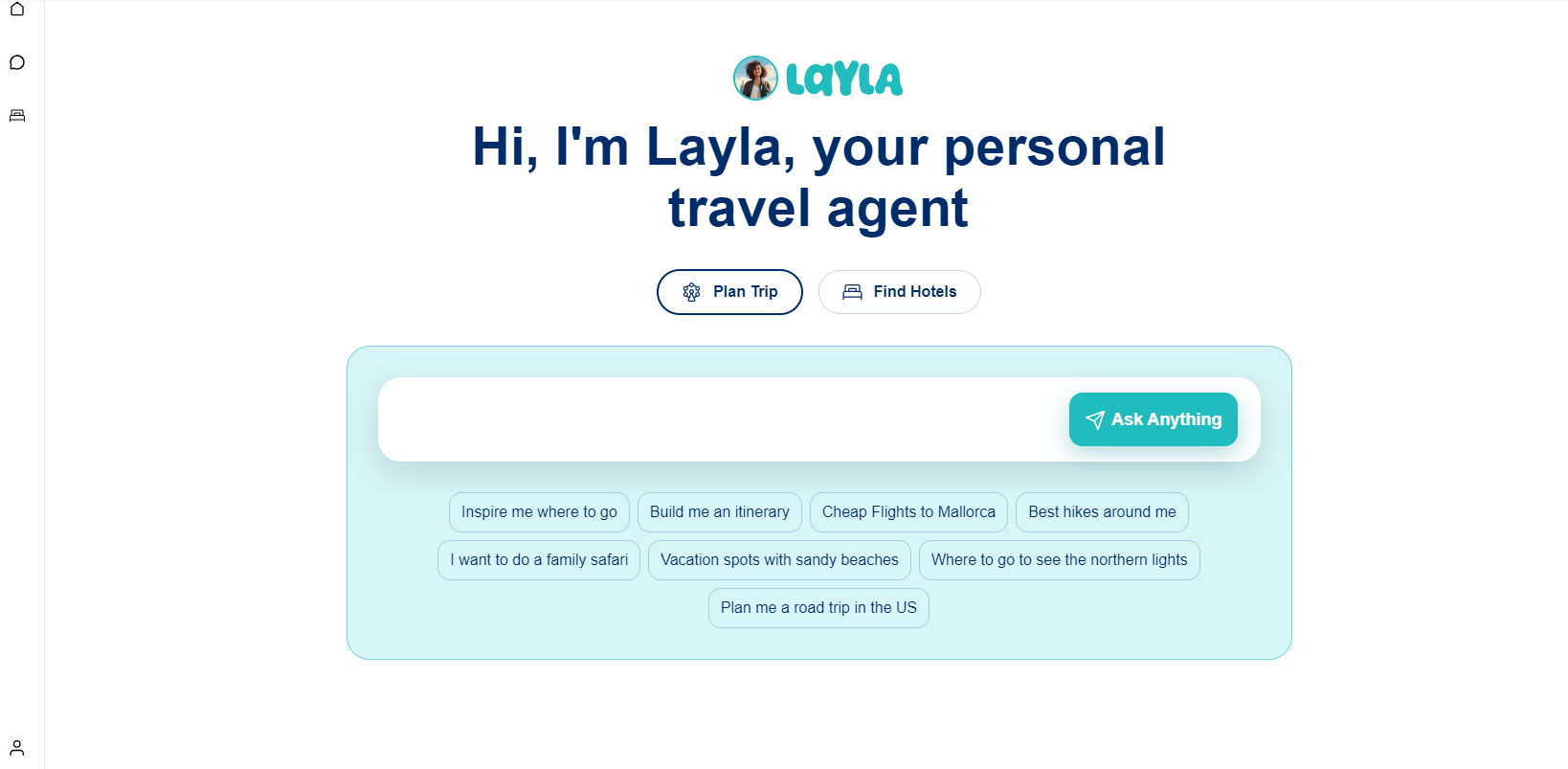
Layla is an AI-powered travel assistant designed to provide personalised travel recommendations and booking services. With its conversational interface, Layla helps users find flights, hotels, and vacation packages based on their preferences and past travel behaviours. It uses AI to analyse real-time data and suggests destinations, accommodations, and activities tailored to each user's needs.
Advantages✅
- Personalised recommendations based on user preferences and history.
- Real-time travel data ensures up-to-date flight and hotel information.
- User-friendly interface with conversational AI for easy trip planning.
Disadvantages❌
- Limited coverage in certain regions and less-known destinations.
- Relies heavily on user data for accuracy, which may raise privacy concerns.
- Lacks deep integration with some major booking platforms.
2. Mindtrip
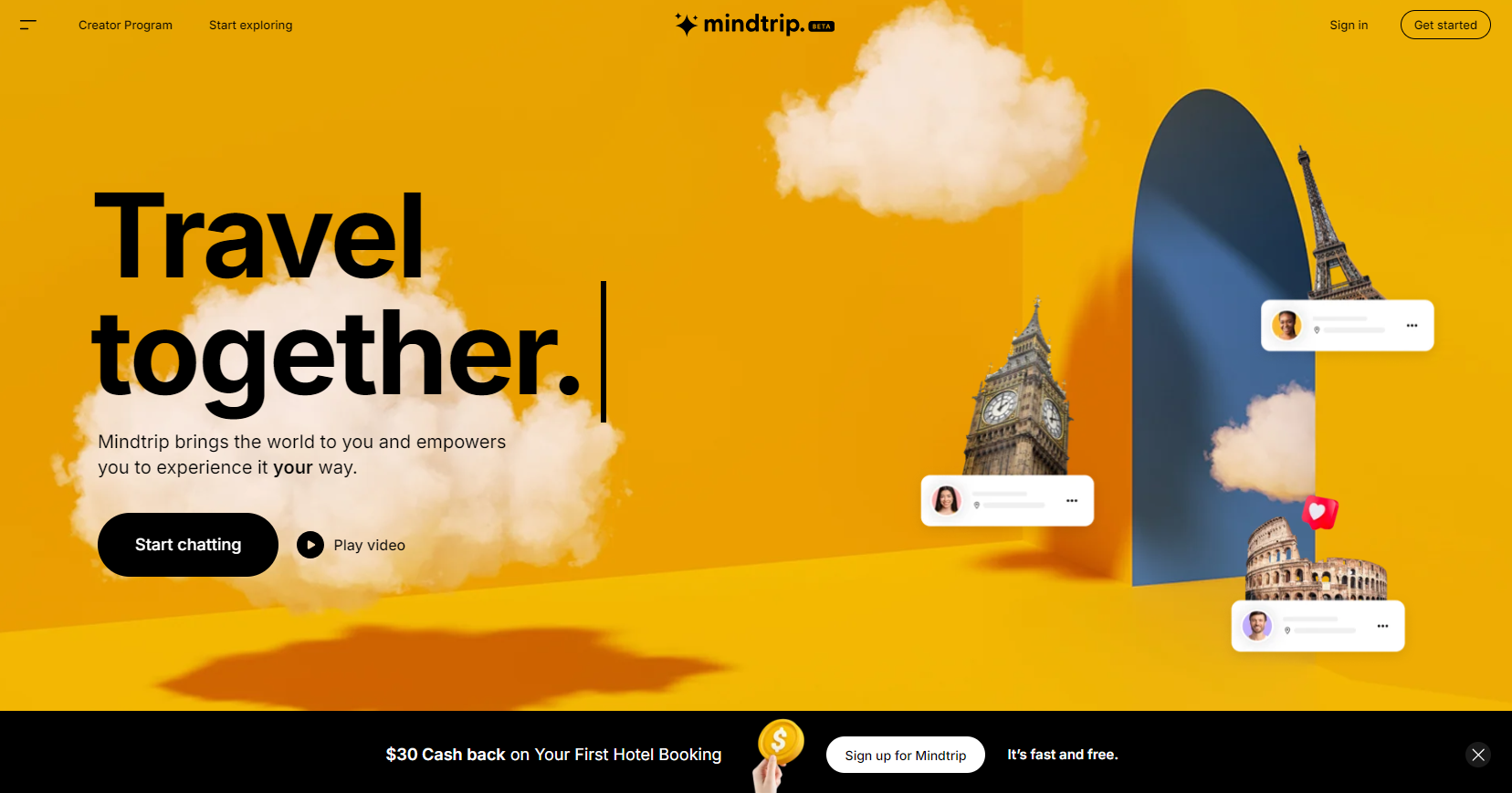
Mindtrip is an AI-driven travel planning tool that provides tailored travel itineraries based on user preferences, budget, and time constraints. Mindtrip's AI recommends flights, hotels, and activities based on user input and can adjust plans in real-time as user preferences change. It offers a seamless planning experience by combining AI with an intuitive interface that simplifies the decision-making process.
Advantages✅
- Dynamic itineraries adjust in real-time based on changing preferences.
- Comprehensive trip planning includes flights, hotels, and activities.
- Budget tracking helps users stay within their travel budget.
Disadvantages❌
- Limited availability of some niche destinations and travel experiences.
- Requires consistent input from users to adjust recommendations.
- Certain advanced features may come at a premium price.
3. Vacay Chatbot
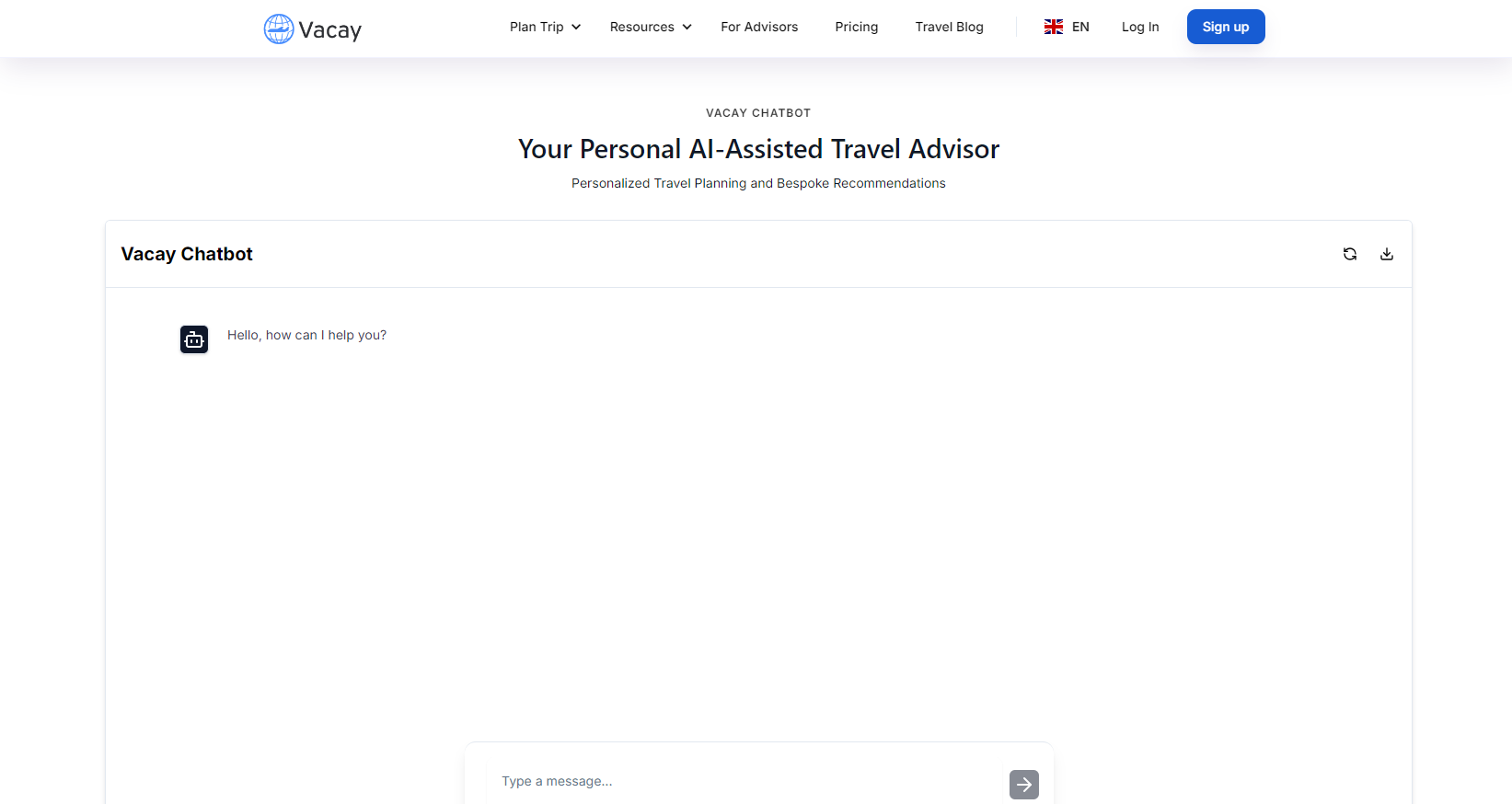
Vacay Chatbot is an AI-powered chatbot designed to provide instant travel advice, booking assistance, and destination recommendations. It allows users to chat with the bot to find flights, hotels, or activities. Vacay Chatbot uses AI to simplify the booking process and offer recommendations based on user preferences and destination trends.
Advantages✅
- Rapid response and instant suggestions for last-minute planning.
- Customizable itineraries and budget management.
- Facilitates booking of live events and recommends family-friendly activities.
Disadvantages❌
- Limited to simple bookings; may not handle complex itineraries.
- Lacks human touch, which some travellers prefer for high-end trips.
- May not integrate with all booking platforms or airlines.
4. Hopper
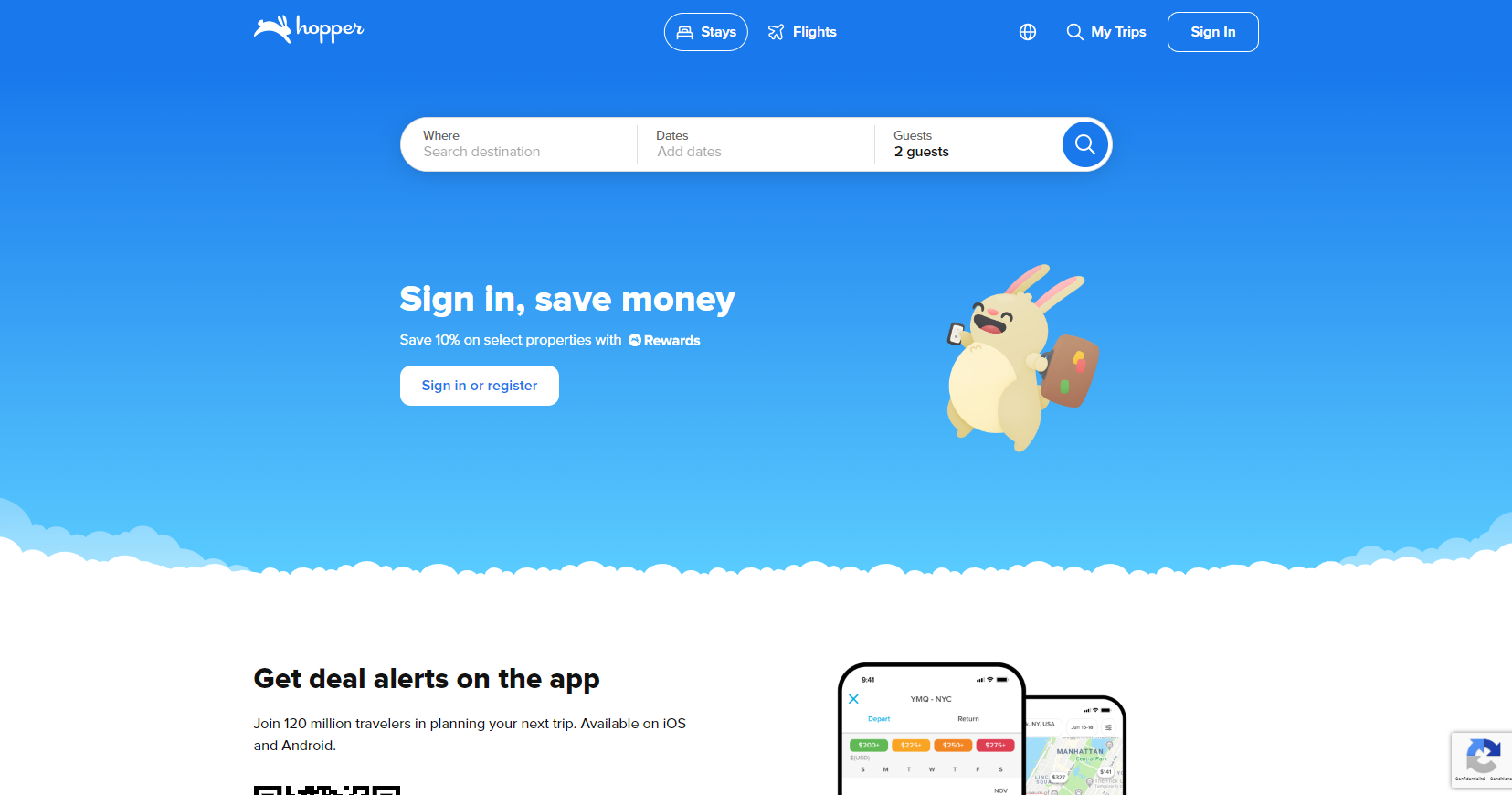
Hopper is an AI-powered travel app that predicts flight and hotel prices, helping users book travel at the optimal time. By analysing historical price data, Hopper advises users on whether to book now or wait for a better deal. The app also features a fare freeze option, allowing users to hold prices for a limited time while they finalise their plans.
Advantages✅
- Price prediction helps users save money by booking at the best time.
- Fare freeze allows flexibility in booking without immediate commitment.
- Push notifications for price drops ensure users don't miss deals.
Disadvantages❌
- Limited to flights and hotels (no car rentals or other services).
- Predictions may not always be 100% accurate.
- Some premium features, like fare freezes, come with additional fees.
5. HelloGbye
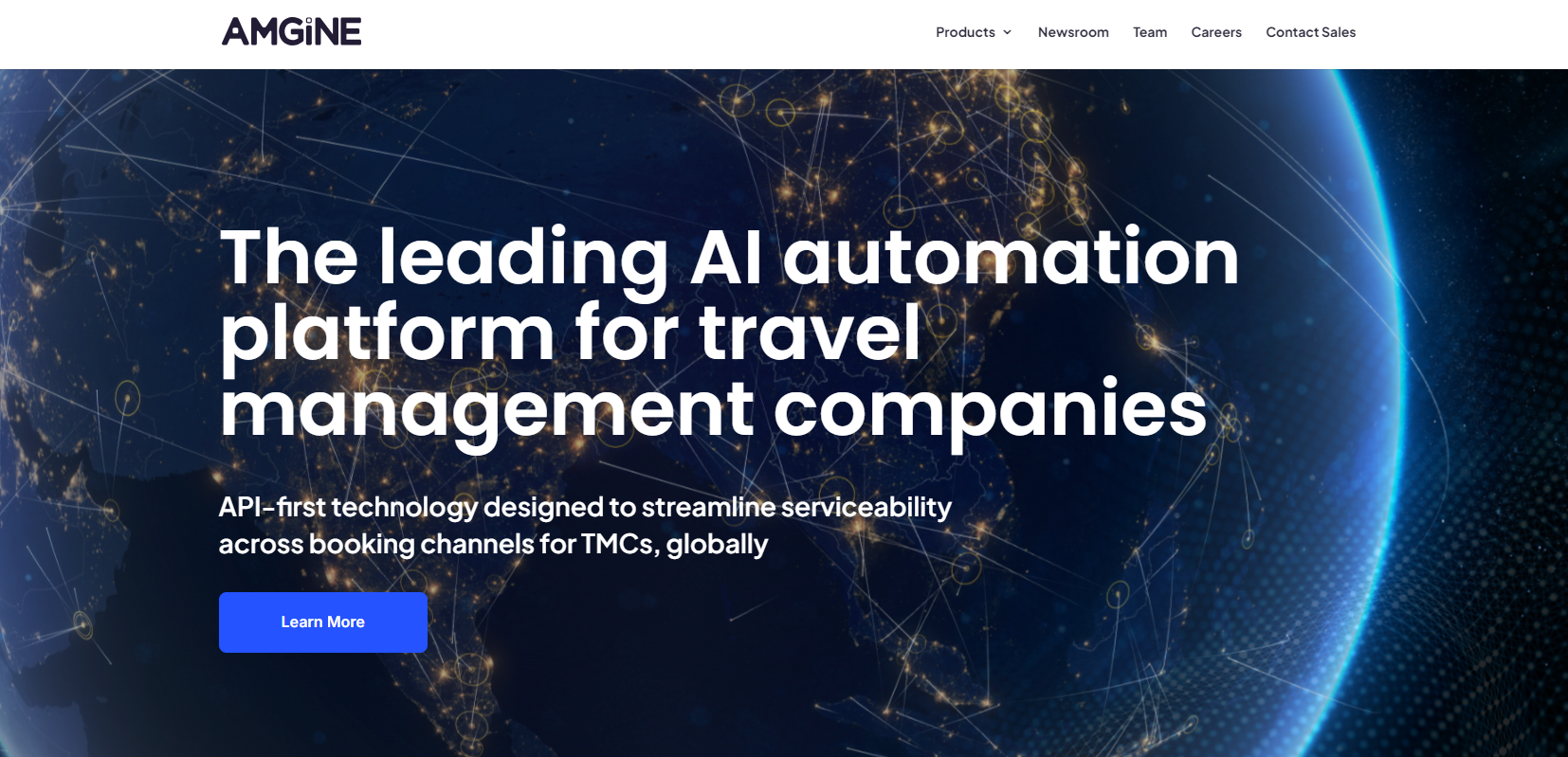
HelloGbye is an AI-driven travel booking assistant that specialises in group travel. Users can plan and book multi-leg itineraries using natural language processing, which simplifies the coordination of complex group trips. The platform automates group bookings, making it easier to align travel schedules and preferences.
Advantages✅
- Natural language processing simplifies booking for groups.
- Group booking automation helps align multiple itineraries.
- Customizable itineraries to accommodate different travellers' preferences.
Disadvantages❌
- Limited to group travel, not ideal for solo travellers or simple trips.
- May have issues handling last-minute changes for all group members.
- Some advanced features can be costly for casual users.
6. Kayak
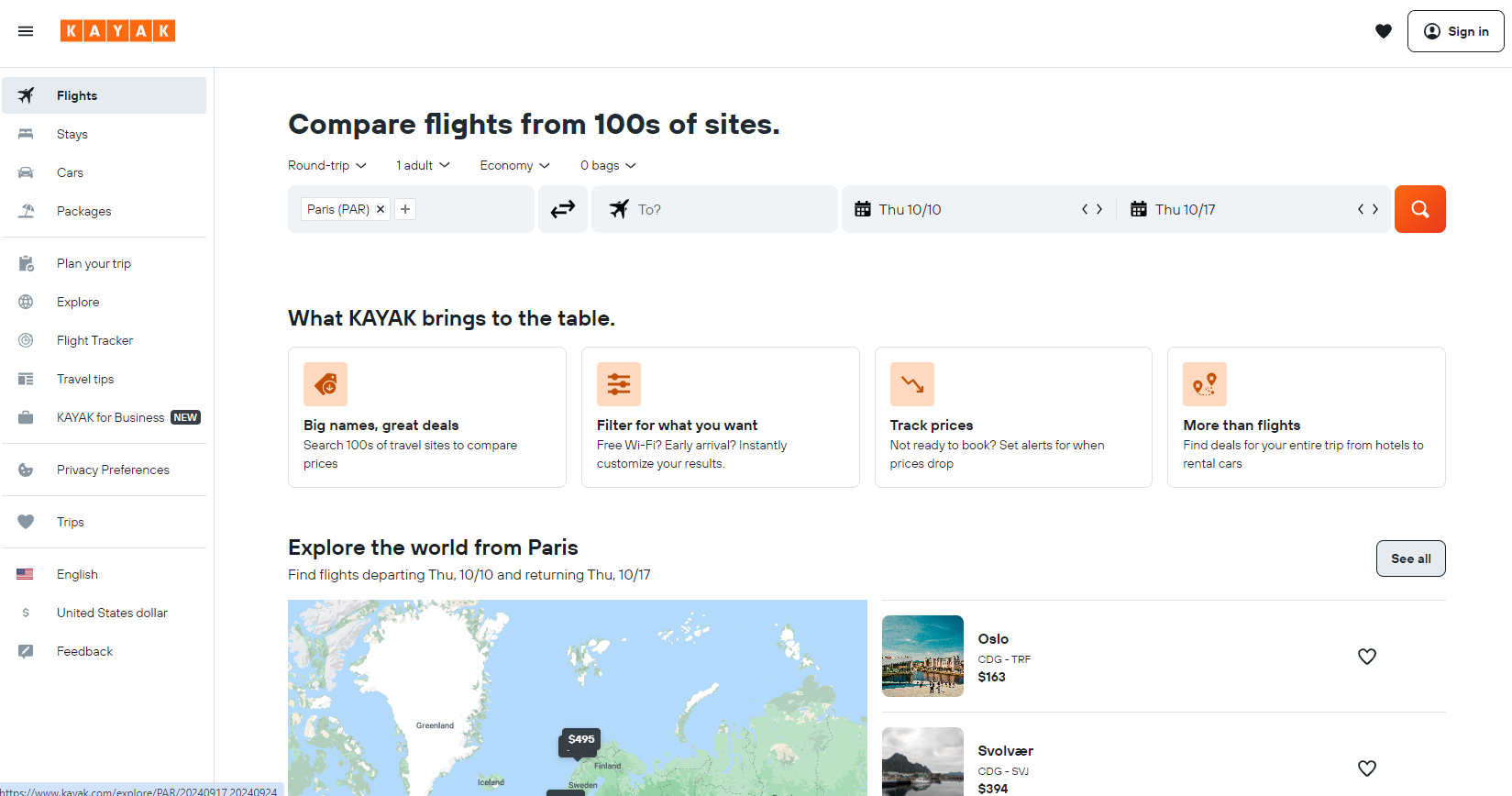
Kayak is an AI-enhanced travel search engine for finding flights, hotels, and car rentals. It offers flexible date search options, allowing users to find the cheapest days to travel. Kayak also provides price alerts and recommendations for nearby destinations, optimising both short and long-term trip planning.
Advantages✅
- Flexible date search helps users find the cheapest travel options.
- Price alerts keep users updated on fare changes for flights and hotels.
- User-friendly interface for planning and managing travel itineraries.
Disadvantages❌
- May redirect users to third-party sites with different pricing.
- Price forecasts can sometimes be inaccurate.
- Can be overwhelming with a large volume of search results.
What Is AI in Travel?
Artificial Intelligence (AI) in the realm of travel signifies the application of AI technologies to boost various segments of the tourism and travel sector. This encompasses the use of AI to refine customer service, simplify travel planning processes, enhance operational efficiency, and tailor the travel journey to individual preferences.
Envision orchestrating a journey where each aspect is meticulously crafted to suit your tastes, from the initial flight booking to the concluding moments of your escapade. This is the vision that Artificial Intelligence (AI) brings to the travel and tourism sector.
AI-driven travel planning tools are reshaping our approach to trip organisation and execution, enhancing efficiency, enjoyment, and personalization. Thanks to AI, travellers now have the luxury of receiving real-time updates, tailored suggestions, and bespoke itineraries designed to meet their specific desires and interests.
Let's delve into the specifics of AI in travel:
You can work smarter by incorporating an AI-based conversation intelligence software that automatically analyses customer interactions.
- Definition and Scope: AI in travel is about employing computer systems capable of executing tasks that typically need human intelligence, like learning, problem-solving, and making decisions. These systems sift through extensive data sets to deliver insights and automate tasks, thereby making the travel experience smoother and more enjoyable.
- Key Applications: AI finds application in several domains within the travel industry, including:
- Customer Service: AI-driven chatbots and virtual assistants are at the forefront of handling customer queries, offering immediate support, and providing customised suggestions.
- Travel Planning: AI tools are adept at crafting personalised itineraries, recommending destinations, and arranging travel details based on the user's preferences and up-to-the-minute data.
- Operations Optimization: AI aids airlines and hotels in streamlining their workflows, managing logistics, and forecasting demand to fine-tune pricing and services.
- Personalization: AI algorithms delve into user behaviour and preferences to present bespoke recommendations for destinations, lodging, and activities.
- Technologies Involved: AI's role in travel often incorporates cutting-edge technologies like natural language processing (NLP), machine learning, and generative AI. These innovations empower AI systems to interpret and react to user inquiries, learn from interactions, and generate personalised content.
- Impact on Travel Experience: The adoption of AI in travel has revolutionised how travellers organise and undergo their journeys. It ensures up-to-the-minute updates, augments decision-making processes, and delivers a more customised and efficient travel experience. This not only elevates customer satisfaction but also enables travel companies to enhance their operations and services.
How Is AI Used in Tourism?
1. Personalised Travel Recommendations
AI algorithms sift through vast data to offer travellers personalised recommendations for destinations, accommodations, and activities. By analysing user preferences, browsing history, and past travel habits, AI-powered travel assistants can suggest hotels and flights tailored to a traveller's previous choices and preferences, streamlining the planning process.
2. Dynamic Pricing and Revenue Management
AI leverages historical booking data, market demand, and external factors like weather and events to adjust pricing in real-time. This strategy allows companies to optimise prices to boost revenue and occupancy rates, especially in the hospitality industry. AI tools analyse extensive data to spot trends and refine pricing strategies effectively.
3. Customer Service and Support
AI-driven chatbots and virtual assistants are transforming customer service in tourism. These systems manage routine inquiries, deliver instant responses, and aid in the booking process. They employ natural language processing (NLP) to provide quick and personalised support, making automated responses feel more human.
4. Predictive Maintenance and Forecasting
In predictive maintenance, AI anticipates and resolves potential issues with vehicles and aircraft to prevent disruptions. By evaluating historical and real-time data, AI predicts flight delays, weather disruptions, and other travel issues, enhancing travel disruption management.
5. Language Translation and Cultural Enrichment
AI-driven translation services facilitate seamless communication between travellers and local service providers, translating menus, signs, and conversations. This helps travellers navigate foreign locales, enriching their cultural experience.
6. Augmented Reality (AR) and Virtual Reality (VR) Experiences
AR and VR technologies offer travellers immersive experiences. Virtual tours allow exploration of destinations before visiting, while interactive maps and immersive experiences deepen understanding of local history, culture, and environment.
7. Baggage Handling and Security
AI applications like BagsID employ biometric data and computer vision for efficient baggage operations, reducing errors and enhancing airport efficiency.
8. Sentiment Analysis and Feedback
AI and machine learning algorithms gather and analyse data to gauge consumer sentiment towards travel brands, enabling companies to refine their services based on customer feedback.
These AI applications not only improve the travel experience but also contribute to operational efficiency and revenue growth in the tourism industry.
Sentiment analysis is also used in conversation intelligence software like Empower by Ringover. This tool analyses call recordings and transcriptions to identify moments of strong emotion, topics discussed, and also provide insights into the representative's performance. With this AI coaching, you'll be able gain valuable learnings on the needs of customers.
If you are curious to learn about Empower, begin your free trial today! This AI tool is a great addition to any tech stack, and offers a wide range of integrations.
What Is the Future of AI in Travel?
The future of AI in travel is set to revolutionise the industry with a focus on efficiency, personalization, and global enrichment. Let's delve into the key trends and expectations for AI in the travel sector:
1. Enhanced Personalization
AI's role in crafting personalised travel experiences is only going to get bigger. Through the power of generative AI and machine learning, travel companies will sift through vast data pools—user preferences, behaviours, and travel histories—to forge highly customised itineraries and suggestions.
This personalised approach means travellers will get precisely what they desire, ensuring trips are more enjoyable and smooth.
2. Operational Efficiency
Operational efficiency in the travel industry is set for a significant boost thanks to AI. Airlines will benefit from AI's ability to maintain punctuality, minimise delays, and streamline staffing and resource allocation. Hotels, too, will leverage AI for room assignments, demand forecasting, and customer service enhancements.
These advancements promise a more seamless and dependable travel experience for everyone.
3. Smart Automation
Automation, powered by AI, will handle routine tasks more prevalently, including check-ins, baggage handling, and customer inquiries. This shift will not only lighten the load on human staff but also increase the efficiency and accuracy of these processes. For instance, some airports are exploring AI-based baggage systems capable of managing luggage without labels, aiming to cut down on lost baggage incidents.
4. Sustainable Tourism
AI's contribution to sustainable tourism is growing, helping companies monitor and minimise waste. Certain hotel chains are utilising AI to oversee and cut down food waste, achieving both significant cost reductions and environmental benefits. The role of AI in fostering a more sustainable travel industry is poised to expand.
5. Ethical and Responsible AI Adoption
With AI becoming more embedded in the travel industry, the focus on its ethical and responsible use will intensify. This includes tackling bias and discrimination, ensuring transparency and accountability, and promoting human oversight of AI systems.
6. Customer-Centric Innovations
The future of AI in travel centres around the customer, with innovations aimed at enhancing the human experience. AI will enable travel companies to fulfil their commitments, ensuring flights depart on time, hotel rooms are ready as promised, and overall customer expectations are met.
This emphasis on customer satisfaction is expected to drive long-term industry growth and loyalty.
AI Travel FAQ
What is the best AI travel website?
Choosing the "best" AI travel website depends on your unique needs and preferences. Some top recommendations include:
- Destinations.ai: This platform stands out for its comprehensive travel planning features. It crafts personalised vacation itineraries using customer preferences and data analysis, covering hotel bookings and flight reservations.
- SmarterTravel.ai: Offering a wide array of travel tools and a vast database of destinations and attractions, it's an excellent resource for trip research and planning.
- Roadtrippers Autopilot™: By blending AI with real traveller data, this tool provides customised itineraries and flexible route adjustments.
Can AI plan a trip for me?
Absolutely, AI can take over trip planning for you. AI-powered tools create personalised itineraries by analysing your preferences, budget, and objectives. They sift through vast amounts of data to recommend destinations, activities, and accommodations tailored to you.
Examples include Layla, ChatGPT, and iPlan.ai, which not only draft detailed itineraries but also offer real-time updates and suggestions.
Is there a travel agent AI?
While no AI fully replaces human travel agents, AI technologies are increasingly supporting their roles. AI assists with itinerary creation, recommendations, and logistics management. Nevertheless, for those seeking deeply personalised and unique travel experiences, many opt for human travel planners who incorporate AI tools to improve their offerings.
